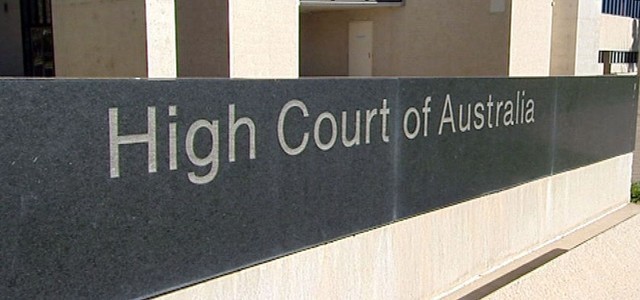The High Court will hear a challenge to the legality of the ACT’s same-sex marriage law on December 3 and 4 – before any marriages will be able to take place.
The court agreed on Monday afternoon to the federal government’s request for an expedited timeline at a brief directions hearing.
The ACT passed historic legislation last month, establishing the country’s first same-sex marriage laws.
But the Commonwealth launched its constitutional challenge on Wednesday, October 25, just one day after the bill was passed by the ACT Legislative Assembly.
The law will begin on November 7 but couples must give one month and one day’s notice of their intent to marry, meaning no wedding can be held until December 8, four days after the hearing.
The court heard on Monday that both parties in the case had agreed to the early December timeline.
The High Court will not necessarily make a ruling after the December hearing and may reserve its decision.
Chief Justice Robert French said at Monday’s directions hearing that whether or not the federal Marriage Act provided an exhaustive definition for marriage would have implications for states considering their own same-sex marriage laws.
Anne-Marie Delahunt, who was at the court during the hearing, is hoping to marry her partner of nearly 20 years, Meg Clark.
She said it was ‘‘worrying and disappointing’’ that the full hearing would occur before any marriages could take place.
‘‘I think we still remain hopeful that the court case will go our way,’’ Ms Delahunt said.
‘‘I am a little surprised that of all the things that go to the High Court, there has been such unseemly haste with this [case].’’
Australian Marriage Equality director Rodney Croome said ‘‘it is disappointing the federal government has sought to expedite this challenge because hundreds of couples like Meg and Anne-Marie are currently preparing for their special day’’.
‘‘It is also hypocritical of the federal government to be rushing to overturn the ACT law when it has said there are many higher priorities for it than dealing with marriage equality at a federal level,’’ Mr Croome said.
The key constitutional issue is expected to be whether the ACT’s Marriage Equality Same-Sex Bill is inconsistent with the federal Marriage Act, which defines marriage as being between a man and a woman, or the Family Law Act, which deals with issues like divorce. The Commonwealth says the federal Marriage Act covers the field for marriage.
If the laws are inconsistent, they are likely to be deemed unconstitutional and declared invalid.
The ACT is attempting to create a distinct and separate type of marriage that can sit alongside the federal marriage laws.
Author: lisa Cox
Publication: The Age
Date: 4 November 2013

